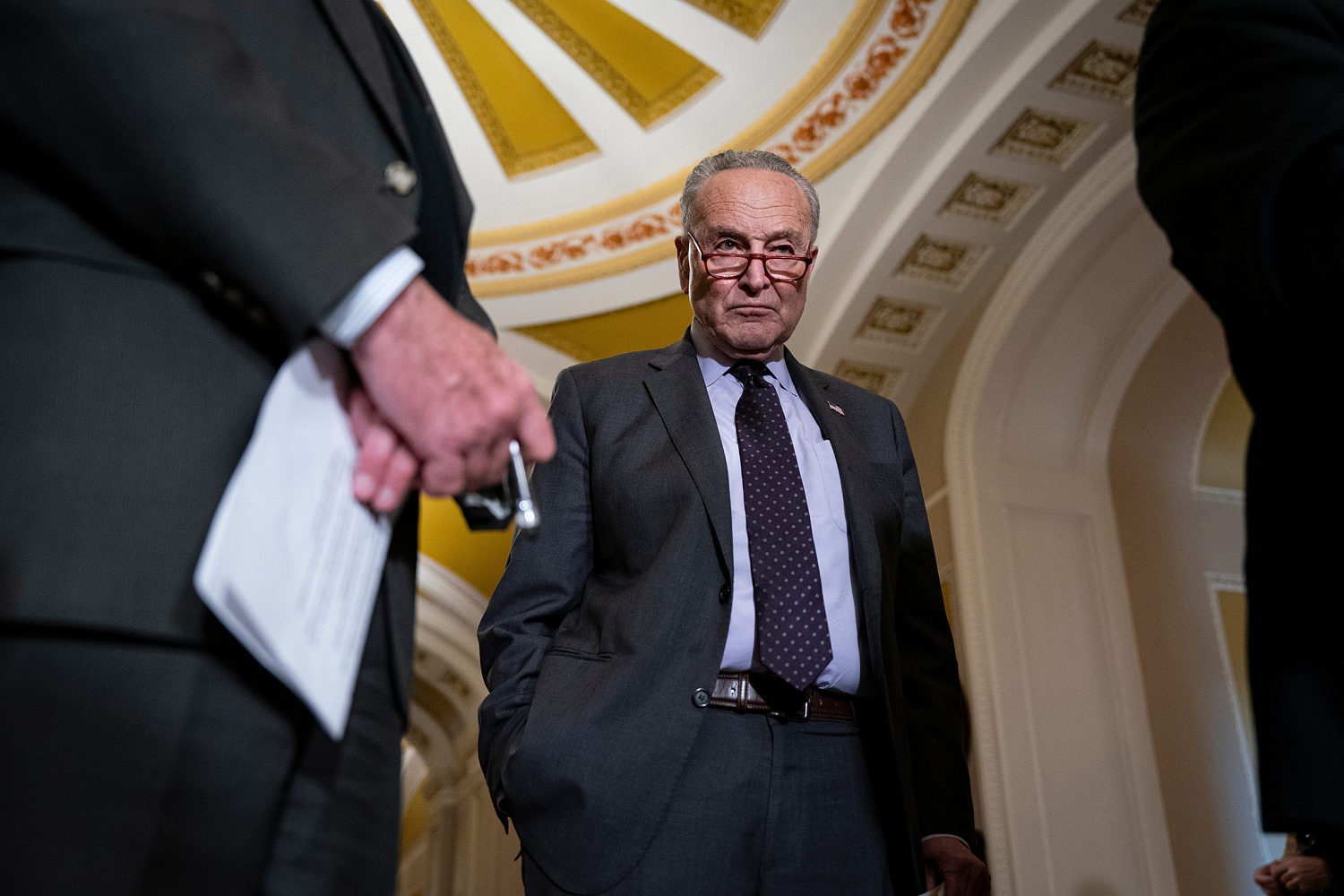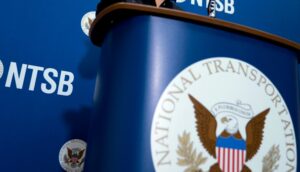The Dictatorship
Chuck Schumer still has plentiful options for stalling Trump

As the Trump administration continues to smash a metaphorical wrecking ball into the federal government, many congressional Democrats seem to have embraced the role of passive observers. In response to a vocal base wondering why they aren’t doing more, Democrats, who have minority representation in both chambers of Congress, have at times complained that they lack power and leverage to act forcefully. There’s some truth to that sentiment — but it illustrates a lack of tactical creativity and a strategic certainty.
It’s true, as House Minority Leader Hakeem Jeffries, D-N.Y., lamented last week, that the House’s rules are set up to benefit whoever can muster a majority, even if it’s only by one vote. The most leverage House Democrats can use then depends on peeling off support from a Republican caucus that is largely in lockstep. In the Senate, though, Senate Minority Leader Chuck Schumer, D-N.Y., has more plentiful options for stalling President Donald Trump’s agenda — and he’s barely used any.
There is another option for, if not totally stopping things, at least slowing things to a crawl.
For better or for worse, the Senate’s rules are designed to empower individual senators and those members who find themselves in the minority on an issue. In general, those rules are meant to keep the debate flowing among the Senate’s members, but there are two mechanisms on opposite ends of the spectrum that are designed to either speed things up or slow them down. Most of the focus in recent years has been on the filibusterwhich requires a vote of 60 senators to end debate and force a vote on almost any substantive matter.
It remains my belief that the filibuster is an antidemocratic tool that doesn’t serve as the bulwark against extremism its defenders say it does, as much as it’s used to shelter abuses of Americans’ rights and prevent positive change. But there is another option for, if not totally stopping things, at least slowing things to a crawl. Much of the Senate’s work is measured in floor hours, the amount of time a bit of business must be debated before a vote can be held on it. If the filibuster is the spanner in the works, meant to grind things to a halt in the Senate, “unanimous consent” is the grease that keeps the gears turning smoothly.
Here’s how I previously described unanimous consent agreementswhich generally involve a senator telling the chair, “I ask unanimous consent for” whatever they are proposing: “Such agreements basically operate on the assumption that all 100 senators are totally fine with whatever action is being proposed, no vote needed. The most basic unanimous consent agreement can be used to insert items into the Congressional Record; the most complicated can line up weeks’ worth of legislative action in the time it takes to read out the agreement.” It only takes one senator’s disagreement to nip those agreements in the bud though making it a primed weapon for obstruction, especially when it comes to speedily working through a raft of nominations.
In 2022, then-Senate Minority Leader Mitch McConnell, R-Ky., was threatening to all but shut down the Senate if Democrats overturned the legislative filibuster to pass a voting rights bill. If he’d followed through with his threat, it would have been a massive headache for Democrats, but also for Republicans. Rejecting a unanimous consent agreement can add hours of debate time from the calendar, as the majority leader often uses lengthy requests to set up even short recesses, general administrative business like approving the Senate Journal’s records and other parliamentary necessities. If each of the mundane tasks usually covered by unanimous consent required a vote, it would also require a majority of the Senate to be present which, if you ever watch C-SPAN 2, you know is a rarity.
Schumer has been reluctant to encourage his members to oppose every unanimous consent request. That’s led though to moments like we saw last week during the leadup to the Senate voting on Tulsi Gabbard and Robert F. Kennedy Jr.’s confirmation. Sen. John Kennedy, R-La., was positively giddy last Tuesday night as he read out the text of a request that allowed for Gabbard’s vote to take place the next morning and cut the post-cloture debate time for Kennedy’s nomination. There was no objection from Senate Democrats, prompting major frustration from supporters who want Democrats to act more like an opposition party.
Schumer has been reluctant to encourage his members to oppose every unanimous consent request.
Tactically speaking, there would be a clear benefit in Schumer pulling every lever possible to make the process of legislating more difficult for his counterpart, Sen. John Thune of South Dakota. Forcing votes on even the little things and requiring Republicans to stay on the Senate floor to keep processes moving would at least be something in the face of Trump’s threatened usurpation of congressional powers. It would also require some sacrifice from his members, who have gotten used to heading home on Thursday afternoons, and some of whom still hope to maintain a measure of comity with their GOP colleagues.
I can see, though, the risk of placing too much emphasis on tactics over a broader strategy. The decision to hold all-night debates arguing against Russel Vought’s confirmation as the head of the Office of Management and Budget makes sense tactically. But it’s impossible to promote such a delay as a victory when the GOP is still able to run out the clock and vote on whatever they want. The same would apply to Schumer pulling the ripcord and rotating in a senator to disapprove of any and all unanimous consent requests. It would be frustrating for Republicans in the short run, potentially even limit some of the damage done in the long run, but can still be overcome with little more than patience from Republicans.
Moreover, the internal debate over tactics is only possible because Democrats still lack an overall strategic goal. When the year began, Schumer argued that allowing some nominations to proceed and making a fuss about the more controversial ones would show that Democrats were being reasonable. As the chaos has grown, that idea has been abandonedbut there’s still reluctance to be seen as an obstacle versus putting forward a more focused economic message.
In contrast, the Senate GOP under McConnell had a simple strategy: Regain and maintain power — period. During the Obama era, that looked like Republicans making sure the Senate became the “graveyard of legislation.” There is no similar agreement as to what that should look for Democrats like under the Trump regime, even as it becomes clear that there’s little that he could do that will cause his legislative allies to cross the aisle in defense of the country. It’s up to Democrats then to decide — and fast — what they want to do over the next two years: hope that Trump will fail and rebuild later, or work to ensure that he fails and preserve as much as possible.
Hayes Brown is a writer and editor for BLN Daily, where he helps frame the news of the day for readers. He was previously at BuzzFeed News and holds a degree in international relations from Michigan State University.
The Dictatorship
Amanda Gorman honors Alex Pretti in new poem

Amanda Gorman shared a powerful poem on Instagram that she wrote in honor of Alex Pretti, the 37-year-old ICU nurse and U.S. citizen killed by a federal immigration officers in Minneapolis, Minnesota, on Saturday.
The poem, “For Alex Jeffrey Pretti,” characterizes Pretti’s killing as a “betrayal” and an “execution.”
Gorman, earlier this month, also paid tribute to Renee Nicole Good, another U.S. citizen killed by a federal immigration officer in Minneapolis on Jan. 7. In a caption accompanying another poem shared on Instagram, Gorman said she was “horrified by the ongoing violence that ICE wages upon our community. Across our country, we are witnessing discrimination and brutality on an unconscionable scale.”
Her poem says, in part: “You could believe departed to be the dawn/ When the blank night has so long stood./ But our bright-fled angels will never be fully gone,/ When they forever are so fiercely Good.”
The 27-year-old writer and activist famously recited her poem, “Blue Light News We Climb,” at Joe Biden’s presidential inauguration in 2021. Gorman has also written poems in the wake of other tragedies in the country, including “Hymn for the Hurting,” about the Robb Elementary mass shooting in Uvalde, Texas in 2022. She also performed a poem she wrote about reproductive rights and the Roe V. Wade Supreme Court case in a NowThis video in 2019.
Erum Salam is a breaking news reporter and producer for MS NOW. She previously was a breaking news reporter for The Guardian.
The Dictatorship
Ted Cruz bashes Vance and Trump in secret recordings
Sen. Ted Cruz, R-Texas, in recordings obtained by Axiosseems to have a bone to pick with Vice President JD Vance and sometimes, President Donald Trump.
In his remarks, which lasted about 10 minutes and were reportedly made in a private meeting with donors sometime last year, Cruz portrays himself as an economically-minded, pro-interventionist who has the president’s ear.
The Texas senator is also heard criticizing former Fox News personality, Tucker Carlson, and his relationship with the vice president. “Tucker created JD. JD is Tucker’s protégé, and they are one and the same,” Cruz told donors.
Cruz, who has clashed with Carlson in the past over foreign intervention policies, bashed the administration’s appointment of Israel critic Daniel Davis to a top national intelligence position. A vocal supporter of Israel himself, Cruz called Davis “a guy who viciously hates Israel,” and credited himself with removing Davis from the job.
The Republican senator also blamed Vance and Carlson for ousting former national security adviser Mike Waltz over similar anti-interventionist sentiments related to Iran.
“[Waltz] supported being vigorous against Iran and bombing Iran — and Tucker and JD took Mike out,” Cruz said.

Cruz also said he has been trying to get the White House to accept a trade agreement with India, but claimed White House economic adviser Peter Navarro, Vance and “sometimes” Trump, are resistant.
Domestically, Cruz cautioned donors about Trump’s tariffs, which he said could result in severe economic and political consequences. Cruz is reportedly heard telling donors that he told the president “if we get to November of [2026] and people’s 401(k)s are down 30% and prices are up 10–20% at the supermarket, we’re going to go into Election Day, face a bloodbath.”
Cruz said a conversation he had with Trump about tariffs “did not go well,” and that Trump was “yelling” and “cursing.” Cruz said Trump told him: “F*** you, Ted.”
“Trump was in a bad mood,” Cruz said. “I’ve been in conversations where he was very happy. This was not one of them.”
In a statement about the recordings, a spokesperson for Cruz said he is “the president’s greatest ally in the Senate and battles every day in the trenches to advance his agenda. Those battles include fights over staffers who try to enter the administration despite disagreeing with the president and seeking to undermine his foreign policy” and that “these attempts at sowing division are pathetic and getting boring.”
In an email responding to MS NOW’s request for comment on Cruz’s reported statements, the White House did not address Cruz’s statements.
Erum Salam is a breaking news reporter and producer for MS NOW. She previously was a breaking news reporter for The Guardian.
The Dictatorship
The real reason Trump and MAGA are so quick to blame Minneapolis shooting victims
Alex Pretti was shot to death on the sidewalk of a street in Minneapolis after he didn’t leave when federal agents demanded he leave. Renee Good was shot to death in her car on a street in Minneapolis because she tried to leave when federal agents demanded she not.
Advocates of President Donald Trump’s administration will cite this disobedience as a central factor in Pretti and Good’s deaths. Each has been assigned a contrived danger, as well, to reinforce the urgent need for their killings: Pretti had a gun (that he doesn’t appear to have drawn) and Good had her car (that she doesn’t appear to have used as a weapon).
But their central offense, among those eager to champion Trump’s politics and policies, was their failure to be pliant. They were at odds with the state and, well, sometimes that’s punishable by death.
It is stunning, though not surprising, to see the president of the United States and sworn federal officials impugn dead citizens so callously.
It has been posited that the eagerness with which Trump and his allies have defended Immigration and Customs Enforcement agents against charges of excessive force, and the alacrity with which they assign blame to the victims of those shootings, demonstrates hypocrisy, given their collective willingness to absolve — to beatify! — the rioters at the Capitol on Jan. 6, 2021. They, too, defied state authority and, in many cases, far more aggressively. But they are hailed as heroes by the current administration.
But this isn’t hypocrisy at all. It’s consistent. If you object to or impede their politics, they will hurt you. That is the consistency and it is why off-duty police were in the mob on Jan. 6 and why Trump supporters defend ICE today. It’s not the badge that matters. It’s the red cap.
The most jarring element of the response to Pretti’s death and to Good’s death is the speed with which the administration has disparaged the victims rather than the perpetrators. Each of them was also immediately asserted to have been a premeditated, violent actor. A terrorist. When each, instead, was at the scene of their unwitting deaths because they were part of and supportive of their community.
It is stunning, though not surprising, to see the president of the United States and sworn federal officials impugn dead citizens so callously. It’s utterly immoral, if not deranged. What flows through their veins is partisanship, and what dominates their thoughts is knocking their opponents and critics back on their heels. Perhaps there are flutters of recognition that this is not how human beings behave, much less political leaders in a democracy. But if those flames flicker into existence, they are quickly snuffed.

And for what! This is the question that continues to baffle me more than any other. Why has the Department of Homeland Security dispatched vans and SUVs filled with masked men to Minneapolis? Most immediately, it seems, it’s because a bad-faith “investigation” from a right-wing media personality made Minnesota a focus of the right’s collective anger. So the president pointed at Minnesota and his shock troops marched.
Their mission has been described in a number of ways, which means that (as with so much else in Trump’s world) the effect was decided before the cause. Maybe it’s about combatting the fraud alleged by the media personality, even though prosecutors had been investigating and securing convictions for social services fraud in Minnesota for years. Or maybe it’s just about uprooting immigrants.
This is the government’s most common explanation. Trump and his aides have repeatedly insisted that the expansive, guerrilla-style raids being conducted by federal agents in Minnesota have been effective at removing the “worst of the worst” criminal immigrants from the area, something it insists that the state’s Democratic leaders had refused to do. (The state disagrees.)
What’s the right ratio here, Mr. President? How many citizens being shot to death is worth this campaign of fear and its sporadic deportations?
At a White House press conference on Jan. 20, Trump held up images of 40 individuals who he claimed had been detained by federal agents in Minnesota. A DHS website titled, “ARRESTED: WORST OF THE WORST,” — identifies just under 500 such people in the state. Some of them (as was the case with Trump’s visual aids) seem less like “the worst of the worst” than like “people with any criminal record at all.” Does having a DUI make you one of the nation’s worst criminals? If you weren’t born here, I guess so.
Even by DHS’ count, though, the government isn’t only targeting “the worst of the worst.” On Jan. 14, the agency put out a press release claiming that they’d arrested 2,500 of the “worst of the worst,” meaning that the website, even with the drunk drivers, is a couple thousand short in its tally. Nationally, of course, ICE has accelerated its detention of people with no criminal records at all. One analysis estimates that 92 out of every 100 people added to ICE detention last year faced no criminal charges and had no past convictions. Besides, violent crime in Minnesota was already on the decline before DHS and ICE showed up (also mirroring national trends).
So the feds rolled up some people with criminal records or maybe pending charges. In doing so, they spread chaos and confusion around the city, shipped a kindergartener off to Texas and sent a baby to the hospital.
In doing so, they killed two residents of Minneapolis, their dying bodies laying at the side of the road.

What’s the right ratio here, Mr. President? How many citizens being shot to death is worth this campaign of fear and its sporadic deportations?
It seems as though the answer is clear by now: As many as can be killed with his base still believing that they were violent opponents of the president’s politics. As long as that belief is sustained, the killings can continue because it means that his supporters’ confidence and trust in him is sustained, too. And that, more even than purifying the populaceis what matters to Trump.
The White House and DHS frequently validate their work by pointing to the killers they’re taking out of the country, outsiders who’d killed Americans. It would be a more effective argument if they weren’t defending the outsiders they brought into Minneapolis who did the same thing.
Philip Bump is a data journalist and MS NOW contributor.
-

 The Dictatorship11 months ago
The Dictatorship11 months agoLuigi Mangione acknowledges public support in first official statement since arrest
-

 Politics11 months ago
Politics11 months agoFormer ‘Squad’ members launching ‘Bowman and Bush’ YouTube show
-

 The Dictatorship5 months ago
The Dictatorship5 months agoMike Johnson sums up the GOP’s arrogant position on military occupation with two words
-

 Politics11 months ago
Politics11 months agoBlue Light News’s Editorial Director Ryan Hutchins speaks at Blue Light News’s 2025 Governors Summit
-

 The Dictatorship11 months ago
The Dictatorship11 months agoPete Hegseth’s tenure at the Pentagon goes from bad to worse
-

 Politics11 months ago
Politics11 months agoFormer Kentucky AG Daniel Cameron launches Senate bid
-
Uncategorized1 year ago
Bob Good to step down as Freedom Caucus chair this week
-

 Politics9 months ago
Politics9 months agoDemocrat challenging Joni Ernst: I want to ‘tear down’ party, ‘build it back up’








